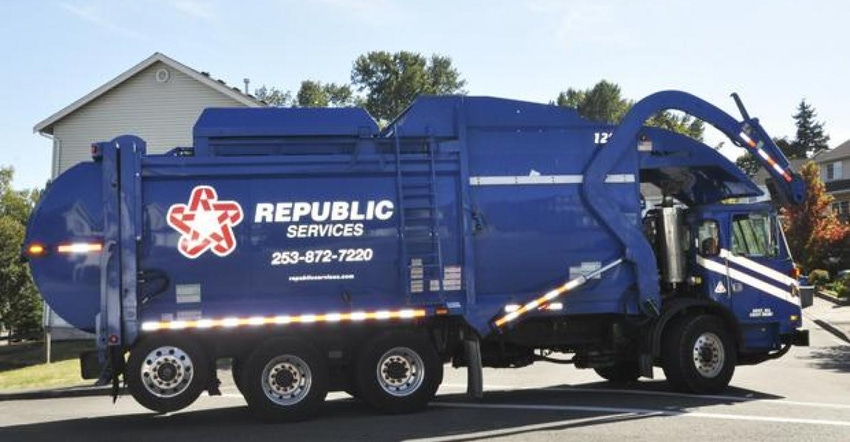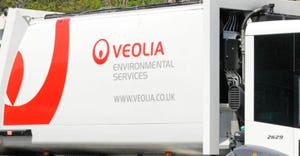Getting Together for the Future of Fleet Safety: Part Two - Republic Services

With the 7th largest fleet in the nation, Republic Services’ drivers face an array of risks and conditions, says Jim Olson, VP of safety.
“Our drivers frequently navigate tight alleyways, parallel parking, highways and a variety of other challenges on the road,” he indicates. And unlike other drivers, they are facing those obstacles in a 25-ton truck.
The company is a member of Together for Safer Roads (TSR), a coalition of private-sector businesses and public sector leaders who are collaborating on global road safety initiatives such as Truck of the Future. The project aims to "create scalable and lasting change" through the exploration of new technologies.
Olson says Republic hopes to “have the opportunity to add additional technology tools to our fleet vehicles that will support our drivers on the road and increase safety in our communities.”
In a three-part series, Waste360 discusses the intersection of road safety and technology with TSR and member companies Republic Services and Anheuser Busch InBev.
Waste360: What unique challenges has your company experienced in terms of road safety?
Jim Olson: One of the biggest challenges is other drivers who are distracted.
This October, we recognized October as Distracted Driving Awareness Month. The number of distracted drivers is on the rise – and from coast to coast, is negatively impacting the number of accidents on the road. In fact, data from the National Safety Council show that a lack of attention behind the wheel accounts for more than 700 injury crashes on a typical day in the U.S.
To ensure our employees are informed and educated, we regularly host safety challenges and awareness campaigns regarding driver safety and aim to ensure customers understand how they can remain safe when encountering a truck on the road or in their neighborhoods.
Every summer, we host a Summer of Safety campaign to educate employees and members of the public about how to stay safe. We remind people about a few critical facts about our collection trucks:
Collection trucks need more space to stop than traditional passenger cars.
While drivers are highly trained and alert, there are places where the visibility is restricted for our drivers.
Keep a safe distance from the truck – at least 15 feet.
Waste360: How have these challenges evolved during the pandemic?
Olson: During the pandemic, Republic Services has experienced some of our safest months ever, which is a testament to our front-line employees. Less traffic on the roads due to lockdowns is probably a factor, but we also have seen that our employees are highly engaged and dedicated to being an essential workforce.
Waste360: Can you please explain your company’s commitment to safety and its goals with this project?
Olson: Our number one priority is safety. Our industry-leading Safety Amplified program provides tools and awareness to help our teams better execute our safety standards. Continual training, multifaceted programs and strategic partnerships, such as with Together for Safer Roads, are the key components of our program.
With this new project, Republic aims to improve safety outcomes on the roads for all drivers.
Waste360: What technologies or innovations have helped your fleet remain safe on the roads?
Olson: Republic has a history of leveraging technology to increase safety for employees and optimize collections.
As one example, to help other drivers be aware of Republic’s large vehicles on the road, we partnered with HAAS Alerts and Waze, a popular consumer navigation app, to place tracking beacons on our trucks. These beacons are used in various situations and enable our trucks to communicate to other drivers using Waze that a slow-moving vehicle is present. During the pilot, over 130,000 notifications alerted drivers of Republic truck location, which allowed them to reroute their course to avoid our trucks entirely.
Waste360: What does it mean to be in a collective (TSR) that is working toward one common cause?
Olson: Since 2016, Republic Services has been proud to be the only recycling and waste services provider partnering with Together for Safer Roads. As a company with a national footprint and large fleet that is on the road every day, we believe that we can help make roads safer for our drivers and other drivers on the road by helping provide small- to mid-sized U.S. fleets with essential knowledge regarding training, safety standards and federal compliance at no cost.
Being a part of a collection that is working toward one common cause means that we are confirming our commitment to safety with like-minded companies in the hopes of achieving our goal together.
Making roads safer for everyone helps protect the communities where we live, work and play.
Waste360: Where do you see the intersection of road safety and technology in the next 5-10 years?
Olson: Many safety features in today’s passenger vehicles are not yet available in heavy-duty trucks. We’re working with equipment manufacturers to incorporate safety elements such as seatbelt alarms, blind-spot awareness, lane departure alarms and other potentially lifesaving equipment in our fleet.
In the next 5-10 years, we anticipate that the opportunities to enhance our fleet through technological advancements will continue to grow and increase our driver safety and reduce accidents in our communities.
Other stories in this series:
About the Author(s)
You May Also Like




